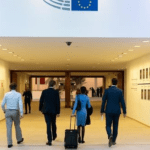Gauge your employees’ motivation with a survey
Monitoring your employees’ mental health is key for having a productive and motivated workforce. Many employees report to have back-to-work anxiety caused by pandemic-induced stress. Some employees may have been personally affected by COVID-19, while others may find returning to the office stressful after months of self-isolation.
This is why, it is a good idea to gauge these emotions and identify any insecurities or apprehensions among your staff about returning to work. This survey can also be complemented by one-on-one meetings for a more in-depth picture. The results will allow you to set goals according to your employees’ current abilities without risking decreasing their motivation even further.
Set short-term goals
Vaccination rates may be going up, but businesses should not forget that Europe is still in a state of pandemic emergency. As things can still change very quickly overnight, it is important that employers set short-term targets for their staff (e.g. monthly or quarterly).
This approach is beneficial in two ways. First, setting short-term targets for your employees allows your business to stay flexible and adapt quickly to unexpected changes. And second, this will allow your employees to achieve results and get recognition quicker. Such ‘fast wins’ can positively affect your staff’s morale and motivation, giving them confidence in their own abilities.
Set small and realistic stretch goals
A stretch goal is an additional goal you set for your workers in case they exceed their initial goal. Although these are a great way to keep your business productive, it is best not to give your staff multiple ambitious stretch goals soon after their return to the office. Start small and keep your stretch goals realistic to avoid early burnout. As your employees are starting to get used to their workload, you can gradually increase the goals.
Boost morale with shared targets
Getting your employees involved in defining their own goals has never been more important. By involving your team in setting their own targets, you can help them get more invested in their work. Not to mention, this will increase your transparency as an employer.
In addition to getting the team involved in goal setting, you can also set shared targets for different teams to boost teamwork and collaboration. After months of working from home, your employees may have lost connection with some of their colleagues, so this is a great way to get them to rekindle their work relationships.
As restrictions ease, employees are preparing to return to the workplace and may be wondering what this will look like. Here are our top four tips for welcoming staff back to their place of work.
More information:
Four tips for welcoming staff back into a post-COVID-19 workplace







Leave a Reply